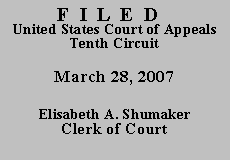 UNITED STATES COURT OF APPEALS
UNITED STATES COURT OF APPEALS
 UNITED STATES COURT OF APPEALS
UNITED STATES COURT OF APPEALS
| ANTHONY C. KENNEY, |
|
| v. | |
| MILLENNIUM RAIL, INC., and
KEITH EGAN,
Defendants - Appellees. |
|
Before HENRY, BRISCOE, and O'BRIEN, Circuit Judges.
Anthony C. Kenney appeals from the district court's dismissal without prejudice of his pro se complaint against Millennium Rail, Inc. and Keith Egan (collectively "Millennium") as frivolous. We exercise jurisdiction under 28 U.S.C. § 1291, and, because Mr. Kenney brought his action in the wrong venue, we affirm.I. Background
Mr. Kenney proceeds pro se and in forma pauperis on appeal, as he did in the district court. We review Mr. Kenney's pro se pleadings and papers liberally and hold them to a less exacting standard than those drafted by attorneys. Hall v. Bellmon, 935 F.2d 1106, 1110 (10th Cir. 1991).
Mr. Kenney was apparently employed at Millennium's Junction City, Kansas worksite as a combination welder and pipe fitter from January 18, 2006 until he was fired on February 20, 2006. After his termination, Mr. Kenney filed a complaint with the Equal Employment Opportunity Commission ("EEOC"), alleging that Millennium had discriminated against him because he is African-American. In the EEOC complaint, he listed Junction City, Kansas as Millennium's address.
On March 10, 2006, the EEOC informed Mr. Kenney that it had not filed a charge on his behalf and requested additional information so it could determine whether Mr. Kenney had probable cause to file a charge. The EEOC's response included a list of the information the EEOC needed and listed a number he could call for assistance. The record contains no right-to-sue notice or other information from the EEOC indicating the status of its investigation.
On March 15, 2006, Mr. Kenney brought suit against Millennium in the United States District Court for the Northern District of Oklahoma, alleging that he was racially discriminated against in violation of Title VII of the Civil Rights Act of 1964. The district court dismissed Mr. Kenney's complaint as frivolous pursuant to 28 U.S.C. § 1215(e)(2)(B)(i) and (ii), but noted that it probably lacked jurisdiction because the events giving rise to his claim occurred in Kansas. This appeal followed.
II. Discussion
We may sua sponte dismiss an action for improper venue "when the defense is obvious from the face of the complaint and no further factual record is required to be developed." Trujillo v. Williams, 465 F.3d 1210, 1217 (10th Cir. 2006) (internal quotation marks omitted).
The applicable venue provision provides that Title VII actions
may be brought in any judicial district in the State in which the unlawful employment practice is alleged to have been committed, in the judicial district in which the employment records relevant to such practice are maintained and administered, or in the judicial district in which the aggrieved person would have worked but for the alleged unlawful employment practice, but if the respondent is not found within any such district, such an action may be brought within the judicial district in which the respondent has his principal office.
42 U.S.C. § 2000e-5(f)(3). See Pierce v. Shorty Small's of Branson, Inc., 137 F.3d 1190, 1191 (10th Cir. 1998) (stating that 42 U.S.C. 2000e-5(f)(3) is the proper venue provision for Title VII claims).
Here, Mr. Kenney's complaint indicates that Kansas is the only proper venue because it is the state where the alleged adverse employment action occurred and where Millennium is located. Moreover, neither the complaint nor the record support venue in Oklahoma. For example, nothing indicates that Mr. Kenney's employment records are maintained or administered in Oklahoma, nor does Mr. Kenney claim that he would have worked there, but for an unlawful employment practice. Furthermore, Mr. Kenney does not even suggest on appeal that he could establish proper venue in Oklahoma.
Accordingly, we AFFIRM the district court's dismissal without prejudice.
Entered for the Court,
Robert H. Henry
Circuit Judge
*. This order and judgment is not binding precedent except under the doctrines of law of the case, res judicata and collateral estoppel. It may be cited, however, for its persuasive value consistent with Fed. R. App. P. 32.1 and 10th Cir. R. 32.1.